Stephen Port: Police assumed Grindr killer’s first victim overdosed because he was gay sex worker, friends claim
Friends say they told police first victim had been with Port, who they believed was ‘dodgy as f**k’

Police may have wrongly assumed that rapist and serial killer Stephen Port’s first victim died of a drug overdose because he was a gay sex worker, his friends told an inquest.
Fashion student Anthony Walgate, 23, was found dead in Barking, east London, on 19 June 2014.
He was given a fatal overdose of the GHB drug by Port, 46, who went on to murder three other gay men.
Inquests into the deaths of Mr Walgate, Gabriel Kovari, 22, Daniel Whitworth, 21, and Jack Taylor, 25, began earlier this month.
Giving evidence via video link, China Dunning, who was friends with Mr Walgate, told the inquest into his death that they had discussed the drug GHB in the past and would never have risked taking it.
“I was convinced that Anthony’s death was suspicious. I... just knew that he hadn’t taken drugs himself and overdosed,” she said.
Ms Dunning added: “I was convinced that it was the actions of Stephen Port. I was convinced that he had his drink spiked or something, and that it was suspicious.”
Kiera Brennan, who was part of the same circle of friends, also told the court that she “felt strongly” that Port had caused Mr Walgate harm.
Mr Walgate would sporadically work as an escort and had arranged to meet Port, who was using the false name Joe Dean, on 17 June at his flat in Barking.
Ms Dunning reported Mr Walgate missing two days later, along with the name, address and date of birth that Port had provided and a physical description of him.
In September 2014, as the investigation into Mr Walgate’s death continued, Miss Dunning told police that if toxicology reports found GHB in his body she did not believe he would have taken it of his own accord.
Asked about how the police responded to her concerns that her friend’s death may be suspicious, Ms Dunning said: “They received the information professionally but I was also aware that maybe they might have come to the assumption that he was young, gay, a sex worker, and I just thought that they would instantly assume ‘yes, he does drugs as well’, or he would be willing to, or he would take the risk.
“I wanted to convince them that they shouldn’t have that stereotype.”
The court was read parts of an earlier statement in which Miss Brennan said the police saw Mr Walgate as “a young boy shagging people for money” and that “when they found out he was an escort they wrote him off”.
She told the inquest jury at Barking Town Hall on Wednesday: “I don’t think it was actively against gay people.
“But I do think there was an unconscious bias and assumptions made because of Anthony’s sexuality, because of the job that Anthony was doing.
“I definitely think that had an impact on how things were conducted or not conducted.”
Port initially pretended not to know Mr Walgate when questioned by police and was jailed for perverting the course of justice in 2015 for the lies he had told relating to his death.
When Ms Dunning attended court for his sentencing, she, Miss Brennan and Mr Walgate’s stepfather Sammy Sak, urged an officer present to examine Port’s laptop but were told that the procedure was expensive.
Jurors were read a statement in which Ms Dunning recalled telling the detective: “We said this guy is dodgy as f***. He’s done something to Anthony.”
Ms Brennan told the court: “We were saying things like there is obviously correspondence between devices, Port must have a laptop, a mobile phone. You must go and get that.
“Why would you not go get that?”
Port murdered his victims between June 2014 and September 2015.
He met them through dating apps such as Grindr, lured them to his flat in Barking, east London, before poisoning them with lethal doses of GBH, a date rape drug.
In 2016, Port, described by a judge as “wicked and monstrous”, was found guilty of all four murders and sentenced to life in prison.
He was also convicted of a string of sex offences and is likely to die in jail.
Since Port’s convictions, the victims’ families have continued to campaign for answers as to why Port was not stopped sooner.
The Met Police was accused of a series of failings in the case, which they denied.
The inquest continues.
Additional reporting by Press Association
